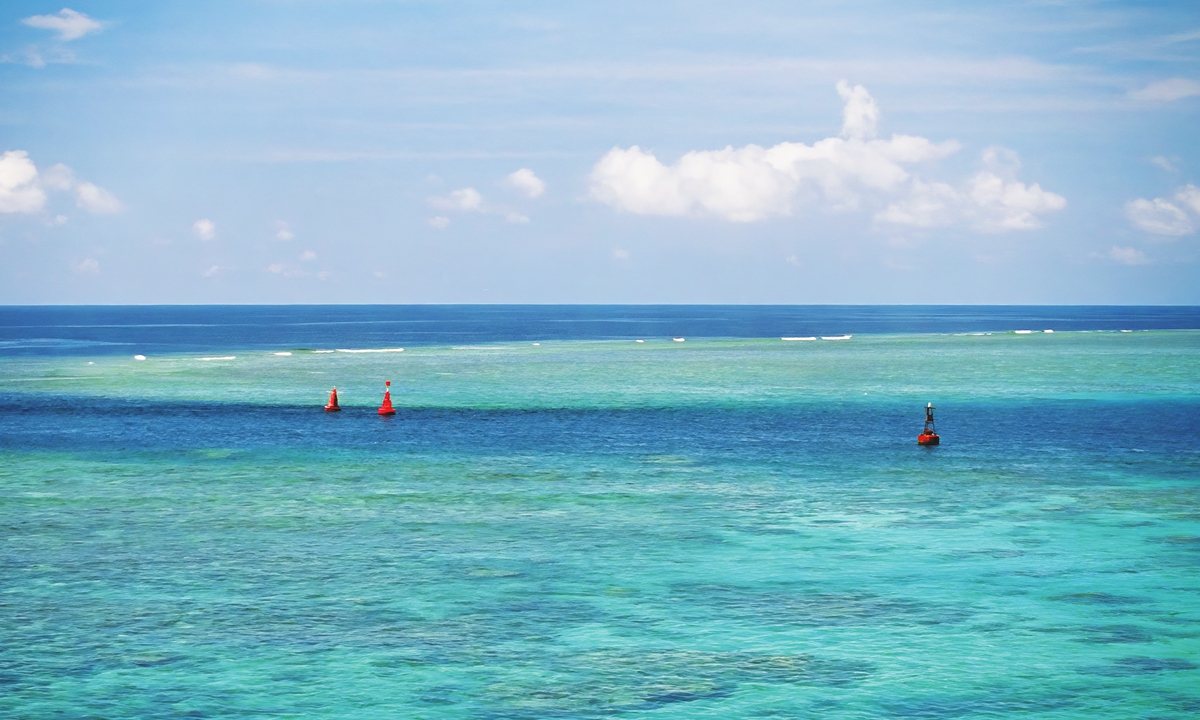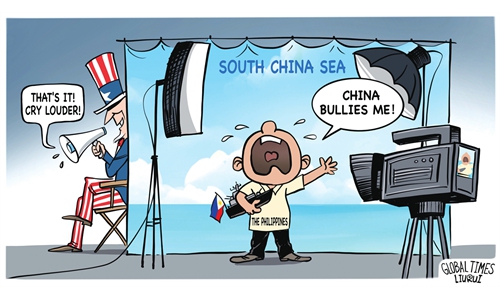'Historical records 100 percent support China's claims in the South China Sea,' says British scholar

A view of China's Nansha Qundao Photo: VCG
Editor's Note:
Recently, the situation in the South China Sea has been escalating. The Philippines has been frequently infringing on maritime rights, provoking incidents and spreading false information to mislead the international community's understanding of the South China Sea issue. How do historical records support China's sovereignty claims in the South China Sea? How to interpret the Philippines' false narrative? In response to these questions, Global Times (GT) reporters Qian Jiayin and Bai Yunyi interviewed Mark Hoskin (Hoskin), professor of the Department of English and International Affairs at China Foreign Affairs University and member of the London Court of International Arbitration. He told reporters that based on his research, historical records 100 percent support China's claims in the South China Sea.
GT: Based on your research on the history of the South China Sea, how do you think historical records support China's claims in the South China Sea?
Hoskin: I think historical records support China's claims in the South China Sea 100 percent. If you look at the surveying records of the East India Company and the Royal Navy, all they show is that Chinese fishermen were living on those islands. And these people [voyagers from the West] know about those islands and who they're communicating with, typically using interpreters from China's Hainan.
You can also see confirmation of this in the transliterations of that time, which are used today, like Hongxiu Island (Namyit Island) and some of the other islands that allow you to locate where the people actually came from through those transliterations. In the case of Namyit, most likely the name was given by the people of Putian, a city in Fujian Province. In Putian, there are 18 places that include "yit" which means "habitable island."So when you look at these kinds of things and how they can be found on the Chinese mainland, like the use of stilt houses in flood areas, you see that the record is durable of people living there and that they were using construction techniques and behaviors that are norms of Chinese society at the time.
GT: Currently, there is a viewpoint that the South China Sea disputes are due to China becoming more powerful and starting to make new territorial claims against other countries. What is your take on this?
Hoskin: I do not agree with this view. China's claim in the South China Sea predates the People's Republic of China, it even predates the Republic of China. The first Western-style sovereignty claim over the Xisha Islands was made by Admiral Li Zhun in 1909. While rescues by Chinese gunboats occurred much earlier, such as that of 55 passengers and crew from the British SS Paladin by the Sui Ching vessel's commander Wei Zhensheng in November 1882, this incident was widely reported in Britain at the time.
These historical records, including British, French and German survey records, all show that the people active in the region at that time were Chinese, and China's sovereignty claims over the South China Sea are not a modern issue, nor are they directly related to the rise of contemporary China.
So part of the reason for generating this idea is the ignorance of history by Western narrators. Another major reason is that they see China's rise as a threat, and they believe that the Chinese navy only truly became a blue-water fleet after the 1990s. Some Western scholars, especially those who do not understand this period of history, regard China's claim as baseless, which shows their ignorance.
GT: You once wrote an article expressing issues with the Philippine view of its territory. From a legal perspective, what do you think are the issues with the Philippines' claims?
Hoskin: They have no basis. The Philippines has been very clever in using and developing laws to suit their own purposes and to suit their claims.
For example, Huangyan Dao (also known as Huangyan Island), whether based on the Philippine Constitution or a series of international treaties defining the territorial boundaries of the Philippines, is not within the territorial boundaries of the Philippines. For a considerable period of time, the Philippines did not assert sovereignty over Huangyan Dao. Also, before its independence, its colonizer, the US, did not assert sovereignty over Huangyan Dao. It was not until the 1990s that then-Philippine president Fidel Ramos claimed that Huangyan Dao is located within the Philippines' exclusive economic zone.
The West Philippine Sea, which is a renaming and a portion of the South China Sea, has no historical basis. In fact, in history, it was always known as the "China Sea." It was only later that it was called, in English, the South China Sea, because that was the sea that Europeans sailed through to get to China. In fact, if Philippine scholars carefully study history, they will be able to discover these truths. However, they do not want to do this because once they do, they will find that their narratives have no legal, historical or factual basis, which will bring them domestic political problems.
GT: Recently, the US, Japan, Australia and the Philippines held their first official joint naval exercise in the South China Sea. How do you think this action, based on strategic considerations rather than legal perspectives, will impact the South China Sea disputes?
Hoskin: It allows the governments of all of those countries to say: Look what we're doing. Our naval forces and our militaries need more funding from the taxpayers to continue this "defense" of the so-called international rules-based order. That's particularly important if you look at Japan, because they want to change the status quo in terms of their pacifist constitution and also the Japanese Self-Defense Forces ability in terms of equipment and posture.
One of the problems that I think is occurring right now in the Philippines is the continued development of military installations. And they want to do so on Ren'ai Jiao (also known as Ren'ai Reef) in terms of turning that old US-supplied warship into something more permanent. They hope to achieve this before the signing of the Code of Conduct in the South China Sea in order to establish a certain status quo. Therefore, they often say that we need to enforce laws related to maritime trade in the past and use the so-called freedom of navigation to accuse and suppress China's maritime activities, which is unfounded. The "freedom of navigation" claimed by the US is not the concept of "freedom of the seas" and the freedom of navigation under international law.
Undoubtedly, the Philippines has received support from the US. The US has not ratified the United Nations Convention on the Law of the Sea (UNCLOS), and it has emphasized that it is not bound by the procedures of the UNCLOS. However, it has now turned the Convention into a tool to suppress other countries. From an American perspective, they are trying to maintain the global status quo. And that relates not to the trade but to the prominence of their navy and its ability to sail wherever they want, whenever they want. This is part of the idea of the US being the world's policemen. No one asked them to take on this role. It's something they took upon themselves to do. That's where the idea of "freedom of navigation" came from; it didn't come from "freedom of the seas."
Interestingly, during the late 1940s and early 1950s, Australia stated several times that they did not want the Philippines to occupy any of the islands in the South China Sea. But now, Australia has signed up with the US and UK to form AUKUS, committing to conducting joint patrols and spending Australian taxpayers' money on activities they don't actually need to conduct. The narrative is that we need to defend "freedom of navigation" in this area and be involved in it. It's a narrative that allows these countries to develop a military that they don't need for their own defense; it doesn't actually benefit their own populations to any large extent.



